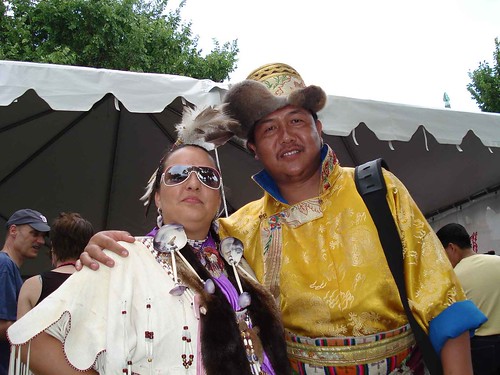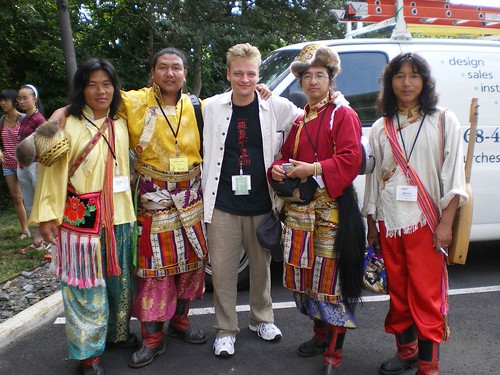
Probably the best profile to start with is the Shangri-La boys, because so much of what happened at the festival started with them. The Shangri-La boys are a singing quartet from
The quartet is made up of two Tibetans, Lurong Nongbu and Damo Luzhuo, as well as two Lisu men, Feng Yuehong and Yu Minghui. They sing, dance and play their fiddles to the traditional sounds of their hometown. They also harmonize really well in a fashion that led us to dub them the “barbershop quartet”.
They do a lot of great traditional stuff, especially paired off by ethnic group, but when you get the four of them together they’ve got this crazy, syncopated song and dance thing that is at once so funny and so cool that it steals the crowd.
These four long-haired guys in Tibetan robes and hemp vests were the center of attention on-stage, off-stage and at the afterparty, among other places. They loved having a good time, drinking and carrying on by the hotel swimming pool, pounding out beats on the table as they belted out drinking songs, and handing out beer and cigarettes to any bystanders who lingered for more than a minute.
This was the scene late one night early in the festival when the first true cultural exchange of our trip began. The boys had been singing a soft drinking song when three people approached our table, the usual one next to the pool. They asked me to translate, saying “we are from the Virginian tribes; we love your music, and my friend here would like to honor you with a drum song.” “Hao!” was the answer.
What you need to know is that this was the formation of our icebreaking ‘cool circle’ that hung out every night and welcomed various festival participants and staff to come out and party with us every night. At that table, we communed with musicians, storytellers, craftsmen and professional organizers from all over the place, and that’s what made the festival so cool. The daytime performances and audience interactions were of course wonderful, but it was the nightly hotel social with its two dollar beers that we looked forward to every day. Some of us joked that the festival on the mall was just a façade get funding for the true festival, which was the behind-the-scenes party among folklorists from around the world.
The Shangri-La boys, with their scraggly charisma, became an anchor for these parties. The parties were held by the cool people at the Folklore Society of Greater Washington, who brought their guitars, basses and banjos to jam out with the festival participants every night. That was really cool, listening to old-time mixing with the sounds of
The Shangri-La boys are already big stars in their hometown. They are the unofficial mascots of Shangri-La, performing at every cultural event in town. They also travel a lot, performing in

No comments:
Post a Comment